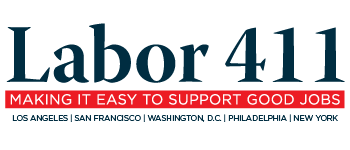NLRA Rights
Organizing Organization through unionism is a legal right. The law has been in effect for over 50 years guaranteeing workers freedom of organization. Here is what U.S. law says (Quotation from the "National Labor Relations Act"): "Employees shall have the right to self-organization to form, join, or assist labor organizations..." "It shall be unfair labor practice for any employer__to interfere with, restrain, or coerce employees in the exercise of the rights guaranteed__(above)”
The National Labor Relations Board (NLRB) is a branch of the U.S. Government. It makes the rules governing union elections and protects workers’ rights. The NLRB is empowered to prosecute employers who violate the law.
A company cannot prevent its employees from organizing nor can it prevent a union election.
The NLRB will order an election whenever it believes there is sufficient interest to warrant the time and expense. It is up to the union to produce this “evidence of interest” through “authorization cards” which must be signed by the individual employees.
The NLRB makes the final decision as to when, where, and how the election shall occur. The election must be by secret ballot so it is impossible to tell how anyone votes.
When the employees win their election, their union is “certified” by the NLRB. “Certification” can be considered the point at which the employer is required by law to negotiate all terms and conditions of employment and reduce them to writing in a SMWIA Contract. Here is the Law* You're Rights
“Section 7. Employees shall have the right to self-organize, to form, join, or assist labor organizations, to bargain collectively through representatives of their own choosing, and to engage in other concerted activities for the purpose of collective bargaining or other mutual aid or protection…”
What this means
· It means that employees have the legal right to help organize, to join and to support a union of their own choosing. This includes such activities as signing a union card, getting others to sign cards, attending union meetings, wearing union buttons, passing out union literature and talking union to other employees. · It states that employees have the legal right to join together and work as a team in order to help each other. · It says that employees have the legal right to deal with their employer as a group, rather than individually. · It gives employees the legal right to take such group action as they feel necessary in order to gain their desired goals so long as these actions violate no other laws. · It does not mean that employees have the right to carry on union activity during working hours or to allow their union activity to interfere with their jobs. (For this purpose, break time and lunch times are not considered as working hours.) When employees try to organize a union for a better and more secure job, employers often fight back strong – in the form of union-busting. Union-busting is any action by management to prevent employees from exercising their right to organize. Union busting attorneys train supervisors on what to say to persuade workers to vote down a union. The “script” doesn’t change much. Whether you are a bus driver, a nurse, a tech, or a call center worker, employers will hire union busters who will train supervisors in this anti-union script, or “playbook.” In this Union-Busting Playbook, you can find out about common union-busting strategies and even read and hear examples from workers who have been through tough campaigns. Watch this video to see first hand how the company will try anything to scare you and you're family from a better life. You Should Know *It is unlawful for your employer, supervisor or foreman to interfere with, restrain or coerce employees seeking to organize or join a union. Any of the acts listed below constitutes a violation of the National Labor Relations Act. as amended. The Employer Cannot
1. Attend any union meeting, park across the street from the hall or engage in any undercover activity which would indicate that the employees are being kept under surveillance to determine who is and who is not participating in the union program. 2. Tell employees that the company will fire or punish them if they engage in union activity. 3. Layoff, discharge, or discipline any employee for union activity. 4. Grant employees wage increases, special concessions or benefits in order to keep the union out; 5. Bar employee-union representatives from soliciting employees’ membership on or off the company property during non working hours; 6. Ask employees how they intend to vote. 7. Threaten employees with reprisal for participating in the union activities. For example, threaten to move the plant or close the business, curtail operation or reduce employees’ benefits; 8. Promise benefits to employees if they reject the union; 9. Give financial support or other assistance to a union; 10.Announce that the company will not deal with the union; 11.Threaten to close, in fact close, or move plant in order to a avoid dealing with a union; 12.Ask employees weather or not they belong to a union, or have signed up for union representation; 13.Make anti-union statement or act in a way that might show preference for a non-union man; 14.Make distinctions between union and non-union employees when assigning overtime work or desirable work; 15.Purposely team up non-union men and keep them apart from those supporting the union; 16.Transfer workers on the basis of union affiliations or activities; 17.Choose employees to be laid off in order to weaken the union’s strength or discourage membership in the union. 18.Discriminate against union people when disciplining employees; 19.By nature of work assignments, create conditions intended to get rid of an employee because of his union activity; 20.Fail to grant a scheduled benefit or wage increase because of union activity; 21.Deviate from company policy for the purpose of getting rid of a union supporter; 22.Take action that adversely affects an employee’s job or pay rate because of union activity; 23.Threaten workers or coerce them in an attempt to influence their vote; 24.Threaten a union member through a third party; 25.Promise employees a reward or a future benefit if they decide “no union”; 26.Tell employees overtime work ( and premium pay) will be discontinued if the plant is unionized; 27.Say unionization will force the company to lay off employees; 28.Say unionization will do away with vacations or other benefits and privileges presently in effect; 29.Promise employees promotion, raises or other benefits if they get out of the union or refrain from joining the union; 30.Start a petition or circular against the union or encourage or take part in its circulation if started by employees; 31.Urge employees to try to induce others to oppose the union or keep out of it.
Page Last Updated: Jul 15, 2022 (06:36:31)
|
| Phone: 901-278-7288 |










